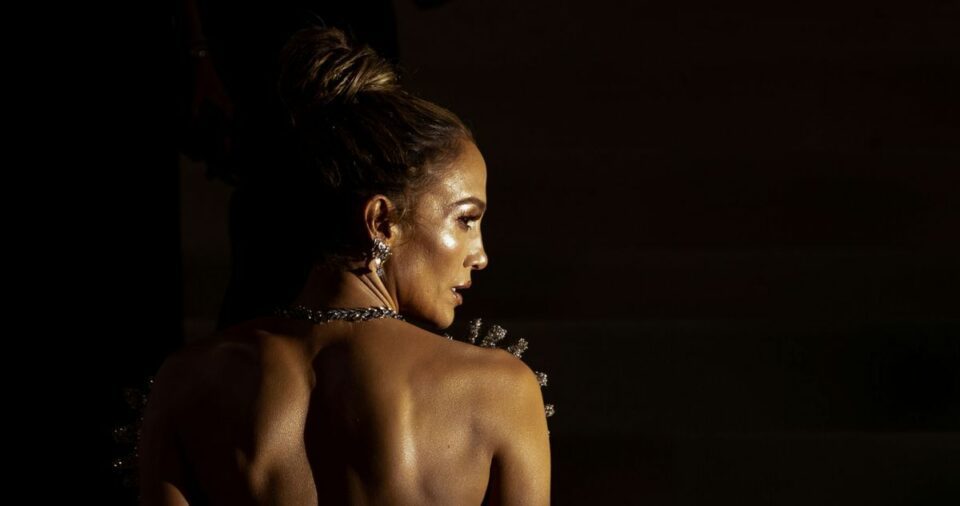
On Friday evening, subscribers to OnTheJlo received an ominous note. The First Lady of Dunkin would be canceling her 2024 summer tour. After a truncated press release about Jennifer Lopez needing time with family came A Special Message to My JLovers OnTheJLo: “I am completely heartsick and devastated about letting you down. Please know that I wouldn’t do this if I didn’t feel that it was absolutely necessary.” Everyone has a limit, she seemed to be saying. ENOUGH.
We may never know the real reason for the singer’s (seemingly) abrupt withdrawal, but we do know that reports of soft ticket sales have dogged her for weeks with rumors suggesting that the 54-year-old’s “necessary” time off was actually a ruse to distract from the fact that the she couldn’t fill stadiums and scalped This Is Me … Now tickets were selling for just ten bucks. But the idea that Mrs. Affleck needed to “take time off to be with her children, family and close friends” also fit perfectly with the Bennifer tabloid narrative (relationship on the rocks!) that’s emerged these past few weeks.
Last month, In Touch coupled its headline “HEADED FOR DIVORCE” with “… and this time it’s not Ben’s fault!” The accompanying story, and most all subsequent stories, followed a similar line: Ben just doesn’t like the spotlight, Ben just doesn’t agree with Jen’s “lifestyle” — the not-so-subtle implication being “Jennifer Lopez is too ambitious and she might lose everything because of it.”
The drama in House Affleck comes amid a surging — and predictably annoying — debate about women and ambition. In the aftermath of Harrison Butker’s commencement speech, feminist theorists and “homemaker influencers” are out in force debating whether we should fight for our share of the professional pie or crave nothing but domestic bliss. Glamour magazine asks, “What If Motherhood Was Considered As Ambitious As ‘Real’ Work?,” while a recent New York Times essay pokes fun at women’s struggle with ambition, all but claiming we’re too afraid to admit we want little, that we’re terrified to opt out and appear “Embarrassing. Mealy, mushy, female.” But wait: “Ambition Is Good, Actually”!
Regardless of Bukter’s pleas — and despite the many sweeping post-pandemic predictions about how we’d entered the Age of Anti-Ambition — in a recent CNBC survey, 88 percent women claimed to be “very” or “somewhat” ambitious. Of course, in that same CNBC poll, women said they continue to be frustrated by a lack of meaningful wage increases and little to no career advancement. No wonder so many women are intrigued by the “soft life” promise sold by trad wives and “marry a rich guy” influencers (who, of course, as professional influencers, haven’t dropped out of the workforce at all).
If you’re like me, none of these conversations about ambition feels quite right. Ambition is not “bad” or “good.” Ambition is little more than an internal force, an inner compass that drives us to set goals and decisions, a map for the life we think we want. But what if our compass is broken? What if it’s driving us the wrong way?
In February, J.Lo put out two earnestly ambitious self-funded films. One, This Is Me … Now: A Love Story, is a multimedia companion to her album This is Me … Now. The second, a documentary, The Greatest Love Story Never Told, followed the making of the first (no one ever accused the actress of subtlety!). And while the overt themes of both films are self-actualization, self-value and self-love, the behind-the-scenes footage tells a different story.
Early on, Lopez discusses how unseen she often felt by her absent father and “narcissistic” mother and how she learned to “work hard” in order to capture their attention and stand out. In scene after scene of the documentary, we see Lopez vulnerable and self-doubting, “I didn’t think much of myself,” she says, wiping away tears. “So the world didn’t think much of me.” When Lopez talks about how “schleppy” she looks and fishes for compliments, Affleck chides her: “We’re not going there … ‘I’m not pretty’ and all this bullshit.” Later, Jen asks Ben if she looks “fat” in a dress (to which he coos, “too skinny”).
None of it — nor the performative-seeming story she tells of walking down the street with her hair down as a teen in the Bronx, a story that’s since been debunked by those who knew J.Lo then — aligns with the confident Big Leo energy Lopez struts in public nor the wise mind and sturdy self-love and -acceptance the Jenny From the Block singer claims to feel anchored by now. Of course, nothing is necessarily “real” in celebrity-funded reality documentaries — it’s possible the singer is simply angling to appear more relatable, a Jenny From the Shaky Self-Esteem Block, to fans. Still, I can relate to the idea of a powerful woman who feels like less than enough no matter how much she achieves.
And this is the thing about ambition for many of us — whether for fame, fortune, executive titles, marriage, or motherhood: It’s not an either/or big-platform issue but more personal, nuanced. Unexamined ambition is often misdirected, used to fill some aching internal lack, tied up in a longing to please an invisible audience, to be seen as “good” girls, as worthy by the outside world. And while the larger “Is ambition feminist or not” debate rages, the conversation we may actually need to be having is smaller and more individual: What are we actually ambitious for? In many cases, it seems like the wrong things, a one-size-fits-all vision of a successful life.
Which is why when I see Jlo, I see myself. Or, even stranger and sadder, I see myself when I was my most ambitious and successful but least fulfilled. This is a woman who is doing the most but is still struggling to sell tickets to her shows, and whose “greatest love story,” having been told, is now reportedly in shambles. In the blind pursuit of money, fame, and/or power (or even purpose and meaning), most of us learn that the rewards for conventional success are almost uniformly hollow, that our ambitious overwork frequently leaves us depleted, unsatisfied, and burnt out. That the prize for this particular pie-eating contest is not the happiness we seek but simply more pie.
At the center of the rumors swirling around the Lopez-Affleck rift is the idea Ben doesn’t like the spotlight and J.Lo does. If you’ve ever seen even one Sad Ben Affleck meme, you’ll believe this to be true. But there’s clearly more to the story than a neat tabloid tagline.
About halfway through the film, Affleck makes a startlingly frank observation about his wife — connecting her childhood trauma to her workaholism, comparing her ambition to his own alcoholism. “Jen felt emotionally neglected as a child,” he starts, explaining that even what we think of as “mild” trauma leaves us with emotional wounds. “It’s a hard thing to look at someone whose professional life is wildly successful, who on Instagram looks like they’re living the happiest life in the world … The thing you discover, like you do with alcohol, is there isn’t enough alcohol in all the liquor stores to fill up that thing. In Jennifer’s case, I don’t think there’s enough followers or movies or records or any of that stuff to still that part of you, that part of you that feels a longing and a pain.”
“Ultimately,” Affleck concludes, “that’s the work you gotta do on your own.”
Truly the most ambitious goal of all.
Related
- Losing My Ambition
- Is Bennifer Really Headed for Divorce?
Jennifer Romolini , 2024-06-04 18:20:59
Source link


